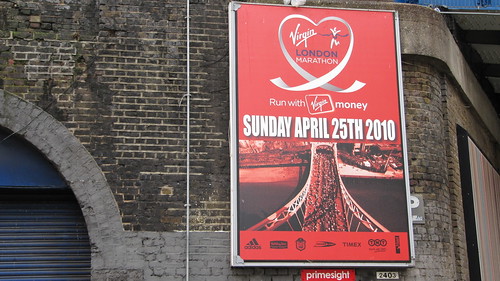Getting the best out of, and for, marathon fundraisers
The London marathon is officially the largest single fundraising event in the world and this year over 36,000 runners will take part and most likely raise over £45m between them for charity. All good, but I was a little surprised to see on the front cover of Third Sector this week how much of an issue runners who “fail to pay” has become.
The event is hugely popular and open ballot places were committed in record time with the organisers receiving more than 120,000 applications in less than three days. Most charities will also have found themselves in receipt of more applications than they had golden bond places (the cheapest allocation given to charities). Consequently a nice little sub-market in places has developed.
I’m not here to pass judgement on conditional advertising deals or event packages but when marathon places are changing hands at effectively well over £1,000 it’s no surprise that fundraisers need to ask for sizeable pledges just to cover their costs (which often include events supports, free advice etc. for runners). This makes it all the more stressful when runners don’t meet their fundraising obligations. So what can we do to minimise the chances of getting caught short?
Thankfully, it appears that the majority of charity runners are committed to meeting their fundraising obligations. For those more inclined to moral turpitude (and indeed to maintain best practice for all runners) there are some positive steps we can take. The list below has been compiled from personal experience as well examples of best practice taken from various charity and events websites.
General ideas
- Have a policy for marathon / running events and publish it in an obvious place. It should outline both your commitment and obligations to the runners and vice versa. I was surprised how few of these I could easily find either as a standalone document or FAQs
- Refer back to your policy across all marathon communications so your supporters are reminded of their and your commitments
- When they meet their commitment, make your runners feel like lottery winners by publicly acknowledging their contribution
- Use their success as part of your future planning and communications eg; proactively share their fundraising ideas, hints and tips with all your runners and supporters. Photos and champagne are great but their success is an asset you can make work for you.
Communications ideas
- Plan a communications programme starting before the ballots even open so you are ready to respond. The event organisers will often provide much of the information and help for charities
- Wherever possible, be open and honest in your communications with supporters about why you are asking them to make a financial commitment. It’s because without it you can’t afford to do the great work you do as well as pay for the marathon place
- If you are able, include the actual costs as evidence
- Talk about this frequently and consistently across all event communications (training advice, reminders, newsletters etc.)
- Lobby national media and at least use your own social media channels to educate supporters about how much it costs to enter people into these events once public interest starts to build
- Provide specific fundraising advice for runners and for your supporters more broadly eg: family and school fundraising ideas so children can help raise money on behalf of parents who are running.
Process ideas
Advertisement
- Develop criteria for deciding who to allocate a place to. Talk to other charities to see how they choose and overlay your own charity’s experience
- Offer the gold bonded places to those runners most likely to raise the highest amounts first. If you need to purchase subsequent places, the unit cost is likely to be higher so try to get your best fundraisers in early
- Secure some formal agreement from your runners before offering them a space. Some charities ask for a £50 registration fee up front, others ask runners to sign up to regular direct debits to meet any shortfall and some even take credit card details with a view to the runner paying any shortfall personally from the card
- Set up a ‘chasing’ process after the event. Focus on the great outcomes you can achieve with the money you are waiting for. If all else fails after several attempts at recovering the funds, objectively use the formal agreement.
This clearly isn’t an exhaustive list so what other ideas would you add?




